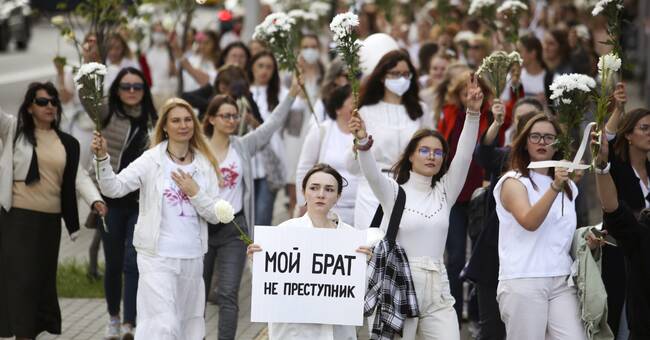President Alexander Lukashenko is said to have ordered an investigation into the mass arrests, and Senate Speaker Natalya Kochanova said in a televised speech that 1,000 detainees had been released.
The outburst came after a day of intense international pressure on the Minsk regime, as well as growing protests following the re-election of incumbent President Alexander Lukashenko, who won 80 percent of the vote in Sunday's election.
-I stand here because we must urgently stop the violence. We must stop torture in prisons and free everyone who has been arrested. We need honest choices, we need change, says 41-year-old teacher Irina.
She was one of many women who gathered in the capital on Thursday, most of them dressed in white and many carrying flowers. Thousands linked arm hooks to form human chains in the peaceful protests.
Russian accusationsA total of around 6,700 people have been arrested during the protests since Sunday, according to authorities. Several have been injured and at least two people have been killed in clashes, where the police used stun grenades, tear gas, water cannons and on at least one occasion fired sharp ammunition to disperse the crowds.
Russia on Thursday criticized foreign attempts to "destabilize" Belarus.
"Clear attempts at outside influence are observed, which aim to cause divisions in society and destabilize the situation," said Russian Foreign Ministry spokeswoman Maria Zakharova, adding that Moscow was following the situation closely.
German selectionGermany, which currently holds the EU presidency, is sharpening its tone when the German Foreign Ministry on Thursday called on Belarus' ambassador to discuss the situation in the country.
"Today, the Belarusian ambassador was invited to the Ministry of Foreign Affairs for an urgent conversation about the latest developments," a Foreign Ministry source told AFP.
The German marking carries extra weight when the ambassador is summoned ahead of Friday's EU meeting on possible sanctions against Belarus.
Neighboring countries, in turn, are demanding that President Lukashenko order security forces to step down violence, and that arrested protesters be released.
The presidents of Lithuania, Estonia, Latvia and Poland are united in the strong call.

